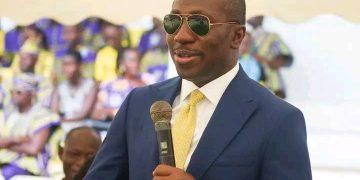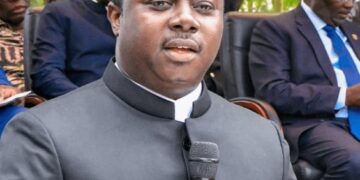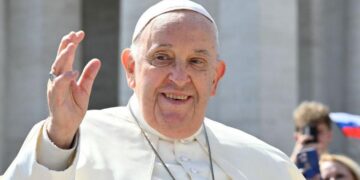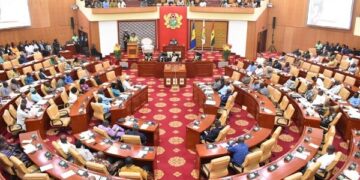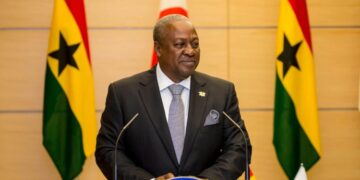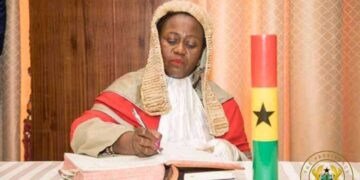Mr Speaker, I thank you for the opportunity to contribute to the Motion: That this honourable House approves the Financial Policy of the Government for the year ending 31st December, 2022 which was moved on Tuesday, 23rd November, 2022 by the Hon Minister for Finance, Mr Ken Ofori-Atta.
Year 2022 Budget – yet another slogan: “Building a sustainable entrepreneurial nation: Fiscal Consolidation and Job creation” When we all know that in reality, kuro mu ay£ hye!
Kuro mu ay£ hye for the youth!
Kuro mu ay£ hye for traders!
Kuro mu ay£ hye for women!
Kuro mu ay£ hye for everyone!
Minority will not support the Budget
Mr Speaker, the NDC Minority will not support the 2022 Budget Statement. We will not support the Budget Statement because of:
E-Levy
Agyapa
Aker-Energy
Mr Speaker, before I continue with my debate, let me commend you highly for your distinguishing yourself by ensuring that the other two arms of Government, namely, the Legislature and the Judiciary are not short-changed by the Executive when it comes to budgetary allocation. Indeed, it is not right that these two arms of Government receive less a paltry allocation of budget with the Executive receiving more than enough fortheir own operation. To the Rt. Hon Speaker, Government is not about the Executive. I believe prosperity will forever be grateful for ensuring that the Legislative and the Judiciary are fairly treated in Ghana’s governance architecture. This can only be good for good governance. This is a victory for our fledgling democracy. Thank you, Rt. Hon Speaker.
Toll Booths
Mr Speaker, you would recall that on 18th November, 2021, a day after the Budget was presented, I had cause to complain about the fiat issued by the Minister for Roads and Highways about the nationwide cessation of road and bridge toll collection. On that day, Mr Speaker gave a directive for the status quo to remain until the Budget was approved. Harunamay notbe right. But at least, his colleague Minister for Finance. At paragraph 306 of the 2022 Budget Statement, the Finance Minister stated that: “…Government will zero-rate tolls on all public roads and bridges. This takes effect immediately the Budget is approved. The tolling points will be removed…” So, why that indecent haste? Why would the Minister for Roads and Highways usurp Parliament’s authority, violate Fees and Charges (Miscellaneous Provisions] Act, 2018 (Act 983] and the Road Fund Act, 1997 (Act 536] by arrogating to himself the powers of Parliament and arbitrarily ordering the cessation of the toll collection on public roads and bridges? Indeed, if the NPP Government wanted the cessation of the toll collection done, they could have come under a Certificate of Urgency and amend the relevant laws to achieve what they wanted. It is estimated that Government is likely to lose about GHdlO million this year for simply stopping the collection of tolls?
Mr Speaker, what is even more bizarre is the rationale for the cessation of the tolls in the country. On 12th March, 2021, when my colleague, the Hon Majority Leader presented the 2021 Budget, this is what he said about tolling at paragraph 266:
“Mr. Speaker, to maintain the improvements on our roads, Government will review existing road tolls and align them with current market rates. This will form part of the framework for promoting burden sharing as we seek to transform our road and infrastructure sector in a post-covid era”. In 2021, we will amend the Fees and Charges (Miscellaneous Provisions] Act, 2018 (Act
983] that governs the setting of Rates and Tolls to accommodate an automatic annual adjustment that will be pegged to the previous year’s average annual inflation as published by the Ghana Statistical Service.”
So what has changed? What data or science is behind this new found reason? At paragraph 305 of the 2022 Budget, the Minister of Finance stated that:
“Mr Speaker, Government is currently charging tolls on some public roads to raise funds for road construction and maintenance. Over the years, however, the tolling points have led to heavy vehicular traffic and lengthened travel time from one place to another, impacting negatively on time and productivity. The congestion generated at the tolling points, besides creating these inconveniences, also leads to pollution in and around those vicinities.”
Mr Speaker, whether this is a prudent decision on the part of the Government or not, only time will tell. The Government cannot cancel road toll, virtually neglect to make releases to the Road Fund and go about soliciting Public-Private Partnership [PPP] agreements to support the road sector.
The real problem in the Road Sector:
Mr Speaker, the real problem in the road sector is not about traffic or pollution but clearly it is about Government’s failure to make timely and adequate release to the Road Fund to settle the huge debts owned contractors. The accruals from Road Fund is a worrying. Many contractors, especially local Ghanaian ones, are becoming insolvent and are laying off workers. The contractors can no longer cope with nonpayment and delay payments. They cannot continue to meet the interest on loans from their bankers.
Mr Speaker, to make matters worse, the Minister for Roads and Highways on 16th December, 2020 signed a contract for the construction of the Accra – Tema Motorway. This is a contract that local contractors can handle. This contract would have led to building of local capacity and would have led to enormous savings especially where it is alleged that the contract sum, which has not received Parliamentary approval, is overpriced by as much as 39%. What is so urgent or special about that contract that the NPP Government does not want to lay it before the people’s elected representatives for scrutiny?
Unsustainable Debt:
Mr Speaker, the Finance Minister reports (in paragraph 109 of the Budget] that the debt to GDP as at end of September, 2021 stood at 77.8%. This translates to GHd341.8 billion. It means the NPP Government moved the public debt from GHdl20 billion to GHd341.8 billion. The debt to GDP is expected to be 81% by end of year. Strangely most part of the public debt, thus 52.1% is from domestic sources (see paragraph 178 of the 2022 Budget Statement]. That is another sign of how Ghanaian businesses are suffering. Government is competing with companies to borrow locally; crowding out funds for local investors.
Tidal Waves
Mr Speaker, in spite of all this accumulated debt with little to show, I am highly disappointed in Government for failing to extend support to our brothers and sisters who were hit by Tidal Waves on 6th November, 2021. This was a natural disaster of significant proportion. It affected five Constituencies including: Keta, Anlo, Ketu South, South Tongu and Ada. The towns that were most affected are: Kedzikope, Dzelukope, Nukpesekope, Tetekpe, Tetevikope, and Abutsakope. Other areas most affected include: Keta Central, Salakope, Adina, Fuveme, Amutinu. The rest of the most affected areas are: Dzita, Kporkporgbor, Dzita, Togbi and Atiteti.
Mr Speaker, the Government in 2015 begun the Blekusu Coastal Protection Project Phase I which was completed in 2019. The Phase II is estimated to cost US$80 million but, unfortunately, this has not found space in the over 100 projects listed from page 290 to 293 of the 2022 Budget. Why? Are the victims not Ghanaians? What wrong have they committed to deserve such bad treatment? I call on the Government to adequately support the victim of the Tidal Waves disaster.
Development Bank
Mr Speaker, we are told that the Government allegedly spent GH(t23 billion on financial sector bailout. While we insist that we could have used that money to improve the financial standing of banks hence save more banks, and protect jobs, incomes and savings, we call on full accountability on all the moneys allegedly spent in the that whole unnecessary enterprise.
Mr Speaker, who collapses banks to create a new one? The Finance Minister is still bent on establishing a Development Bank.
Mr Speaker, the ADB was established by the Agricultural Development Credit Cooperative Bank Act, 1965 (Act 286]. The NIB was also established by the National
Investment Bank Act, 1963 (Act 163] as amended by the National Investment Bank (Amendment] Decree, 1975 (NRCD 316]. Even the Ghana Exim Bank was established by Ghana Export-Import Bank Act, 2016 (Act 911]. The question is, why is the Finance Minister so adamant in bringing a legislation for purposes of establishing the so-called Development Bank Ghana. Meanwhile, taxpayers’ money has already been committed for purposes of capitalising that bank. The Finance Minister stated at paragraph 392 of the 2022 Budget Statement:
“Mr. Speaker, Government has committed to capitalising DBG with US$250 million, of which US$200 million has already been paid. In addition, through the effort of Government a total financing package of around US$550 million has been lined up for DBG from development partners.”
What is the Finance Minister and the NPP Government hiding? I hope this bank does not veer off like the existing banks.
The E-levy
Mr Speaker, in order to place my debate on the E-Levy in perspective, kindly permit me to refer to the Mid-Year Review of the 2020 Budget, presented to us by Minister Ken Ofori-Atta on 23rd July, 2020 where he stated at paragraph 433:
“Mr. Speaker, with the policy to promote digitalisation as a major policy intervention in the Ghana CARES Programme to catalyse economic activities and promote growth, as well as the increasing use of communication services as a result of the impact of the COVID-19 pandemic, it is proposed that the Communication Service Tax be reduced from 9 percent to 5 percent, effective September 2020. It is anticipated that this policy measure will provide some relief to households and businesses in the procurement of communication services such [as] data and airtime as part of measures to mitigate the impact of the COVID-19 pandemic and promote digitalisation.
Then on 17th November, 2021, the Finance Minister has the following to say: “After considerable deliberation, Government has decided to place a levy on all electronic transactions to widen the tax net and rope in the informal
sector. This shall be known as the “Electronic Transaction Levy” or “ELevy”. Electronic transactions covering, mobile money payments, bank transfers, merchant payments, and inward remittances will be charged at an applicable rate of 1.75 percent, which shall be borne by the sender, except inward remittances which will be borne by the recipient [See paragraphs 315 and 316 of the 2022 Budget Statement].
Mr Speaker, the Electronic Transaction Levy (or E-Levy] is not a case of “widening” the tax base or bracket This is further punishing the same known taxpayers yet again and including a few who use mobile money accounts. It is a blanket tax on everything electronic. E.g. From taxing a person who has already paid tax on his income for moving that same money from one account to the other when there is no spending except bank charges, to pay for credit for their phone which already has CST on it, for paying water and electricity bills which are being taxed for NHIL, VAT et cetera, just so a few non-taxpayers can pay some tax for mobile money transactions. If that is the case, then it should be restricted to only mobile transactions. They should do the hard work of bringing those who do not pay taxes already into the system rather than repeatedly punishing those who already pay again and again. Or tax for e-payments for government services.
Mr Speaker, the Government cannot be asking people to use digital services and systems to improve efficiency and cost reduction and tax them again for doing so. The primary interest in doing this seems to be more about what some individuals will be gaining. Is it another system and contract on a commission basis by a friendly IT company to manage the revenue collection?
Mr Speaker, we would all appreciate that patronage of digital platforms increased during the COVID-19 period. Now Government simply wants to take advantage to cash-in on the e-transactions registered over the period. Sadly, we are aware of some moves by Government agencies to put pressure on businesses and employers to patronise mobile money transactions. It is not the way to go. We cannot worsen the plight of those who are already burdened with numerous taxes.
Mr Speaker, we still recall when the NDC introduced VAT and the NPP vehemently opposed it but are now benefiting GHd43 billion annually from it Unlike the NPP, the NDC Minority will support innovative, progressive and business-friendly tax initiatives and policies. But the NDC Minority will not part of any decision that seeks to worsen the woes of the already impoverish, suffering and struggling Ghanaian people. Government should not move the toll booths from the roads to the digital space. Government should not create traffic and pollution on the digital highway. What kind of opportunistic tax policy is that?
Review of Fees and Charges
Mr Speaker, the Finance Minister stated at paragraphs 247 and 304 that Government will increase fees and charges of MDAs by 15% effective 1st January, 2022. He added that:
The fees and charges will be subject to automatic adjustment consistent with the annual average inflation as announced by the Ghana Statistical Service (GSS] with the consent of the Minister responsible for Finance. A comprehensive review will be conducted after every fifth-year taking into consideration, other factors besides inflation including, improvement in quality of service delivery and privatisation of some of the services where feasible.”
Mr Speaker, while I agree that Parliament gave some authority to the Minister for Finance to review fees and charges as provided in section 2 of the Fees and Charges (Miscellaneous Provisions] Act, 2018 (Act 983]. Nonetheless, Parliament jealously guarded its prerogative role of being the only authority to impose taxes under article 174 of the 1992 Constitution. Hence section 5 of the Fees and Charges (Miscellaneous Provisions] Act, 2018 (Act 983] requires the Minister for Finance to review the fees and charges through Legislative Instrument. Section 5 of Act 983 provides:
“The Minister may, by legislative instrument, make Regulations to prescribe and review the fees and charges levied by a Ministry, Department or Agency listed
in the Schedule…”
So, clearly a Legislative Instrument will have to meet the requirements of article 11 of the 1992 Constitution which requires such Instrument to be laid in Parliament for 21 Sitting days. Mr Speaker, so on what basis is the Finance Minister seeking to subject the fees and charges on automatic adjustment? This House deserves better!
Unemployment & Public Sector Workers
Mr Speaker, I have always maintained that unemployment remains one of the biggest national security threat in the country. I will always support any cogent, pragmatic and sustainable policy to address the issue of youth unemployment. The NPP Government, however, should be candid with Ghanaians when it comes to the issue of unemployment.
Mr Speaker, 13th November, 2019 the Minister for Finance on page 202 of the 2020 Budget Statement stated that they have recruited over 350,000 people into the public service. At that time, I doubted the figure and I referred to the staff strength in the public service of Ghana stood at 645,695 as at December 2016, [Source: Controller and Accountant General’s Pay Roll Report for January 2017, page 4], Today, two years after the 350,000 figure was fed to this honourable House, the Finance Minister now reports that at paragraph 32 of the 2022 Budget Statement that “Government has employed almost 300,000 onto the public payroll since 2017 in key essential services sectors.” So what happened to the 50,000 people?
Status of “Obaatan Pa”
Mr Speaker, on 23rd July, 2020 during the Mid-Year Review Budgetof 2020, the Minister for Finance has this to say at paragraph 473:
“Mr. Speaker, to ensure that we do not only survive this pandemic but recover and thrive, this Government is rolling out a three-and-a-half-year recovery and revitalization programme. The Coronavirus Alleviati o n & Revitalisation of Enterprises Support (CARES) programme allows us to recreate our economy and set it on a course that we yearn for. It will involve an investment of GHcClOO billion from 2021 to 2023, of which GHd70 billion will come from the private sector.” (of 2020 Mid-Year Review).
The Minister continued at paragraph 478 that:
‘Let me reiterate, Mr Speaker, the President’s plan for the next three and a half years.
An unprecedented GHdlOO billion Ghana CARES “Obaatan Pa” Programme to transform and modernise our society
For the next 6 months:
Reduce CST rate from 9 percent to 5 percent;
Establish a GHd2 billion Guarantee Facility to support all sectors of business and job retention;
Establish an Unemployment Insurance Scheme;
Create a GHdlOO million Fund for Labour and Faith-based organisations for retraining and skills development;
Increase the CAPBuSS Programme by GHdl50 million to, among others, facilitate credit of GHd50 million to support the Creative Arts, the Media, and the Conference of Independent Universities;
The Minister also stated the following:
“Mr. Speaker, in consultation with the Bank of Ghana and the banks, Government will establish a Guarantee Scheme of up to GH(t2.0 billion to enable businesses to borrow from banks at more affordable rates and at longer tenor so that they can undertake necessary adjustments in order to survive COVID- 19 and thereby retain jobs.” (paragraph 397].
“…Government is providing a Seed-Fund for a Retraining Programme to help workers who are laid off to either improve their skills or acquire new skills to improve their chances of finding new employment. In addition, Government through the Ministry of Employment and Labour Relations (MELR], will work together with the Social Partners to establish a National Unemployment Insurance Scheme.” (paragraph 398]
Mr Speaker there were similar promises at paragraph 402 regarding Agenda 111, which sought to construct a 100-bed hospital in 88 districts that currently lack such
facilities; six new regional hospitals; two new psychiatric hospitals as well as infectious disease centres for each of the three ecological zones.
Mr Speaker, clearly managing an economy is not about big promises, big numbers and catchy slogans. Managing an economy is neither about using foul and flowery language. It is about being truthful to the Ghanaian people and getting them on board to appreciate the real situation so that they can support the Government of the day to do what is right and proper.
Nonetheless, the NDC Minority will continue to demand for full accountability of all the COVID-19 expenditure.
GNPC – Aker Energy
Mr Speaker, on GNPC and Aker Energy agreement, the Minister stated at paragraph 829 that:
“Parliament granted approval to GNPC to acquire 37 percent stake in the Deepwater Tano Cape Three Points [DWTCTP] block and 70 percent of the South Deepwater Tano [SDWT] block from Aker Energy and AGM Petroleum Limited, respectively.”
Is that what Parliament simply approved? On Friday, 6th August, 2021, Parliament approved what is stated subject to three main conditions:
That terms and conditions of the loan for the acquisition of the shares shall be brought to Parliament for consideration pursuant to article 181 of the Constitution;
That the Petroleum Agreement between GNPC Explorco and Aker Energy/AGM Petroleum shall be laid in Parliament pursuant to article 268 of the Constitution and the Petroleum (Exploration and Production] Act,
2016 (Act 919]; and
That a technical report from the relevant Ministries on the acquisition shall be secured and furnished to the Committee on Mines and Energy and the Finance Committee.
[See page 14 to 16 of the Votes and Proceedings of 6th August, 2021]
So, has the two Ministries – Finance and Energy – furnished the House with these three documents?
Statutory Payments
Mr Speaker, in spite of the bright picture that is being painted about the economy, the NPP Government is still struggling to meet its obligations regarding statutory payments.
The GETFund is not getting any funds.
Releases to the Road Fund is problem.
Payments to the National Health Insurance Scheme is worrisome.
Releases to the District Assemblies Common Fund is a wahala.
Even payment of workers Social Security contribution to SSNIT is becoming a problem. This has further exacerbated the precarious nature of SSNIT where the sustainability of SSNIT in the next few years is very doubtful.
Cocoa Roads
Mr Speaker, regarding the amount allocated for cocoa roads, in mid-June, 2021 the Minister for Food and Agriculture, stated that the government has earmarked 286 cocoa roads for construction at GHdl3.6 billion. Meanwhile, at paragraph 696 of the Budget Statement, the Finance Minister indicated that “…Government, through COCOBOD, allocated an amount of GHd456.6 million to continue with the CRIP in the 2020/2021 cocoa season. For the current 2021/22 season, an amount of GHd400 million has been earmarked by COCOBOD for the programme.”
So, how much has been allocated for cocoa roads? Who is going to reconcile figure in the Minister’s answer to what is provided in paragraph 696 of the 2022 Budget Statement?
Improving our Budget Statements
Mr Speaker, I strongly recommend that in future, Parliament as an institution should not simply debate and approve a Budget Statement as presented by the Minister of Finance for and on behalf of the President. Parliament should be capable to subjective every paragraph to strict-proof. If there any assertion in such a Budget Statement that cannot be substantiated by any concrete evidence, such assertion should be expunged from the document before it is voted upon. In the past, Governments have tried to say any and everything in a Budget Statement and easily get away with it. It is high time, Parliament raised the bar and demand that only verifiable statements are presented to the House.
Conclusion
Mr Speaker, this Budget is not about building any sustainable entrepreneurial nation or about fiscal consolidation and job creation. It is about sustaining the suffering of the Ghanaian people. It is about burdening the poor Ghanaian. It is about NPP taking every opportunity including grabbing of public lands. Even the 1D1F has not yielded the desire results. It has neither contributed to growth nor development. It has nothing to do with any job creation. The Infrastructure for Poverty Alleviation became a still birth. At best, it is about breaking people’s pockets. It is about breaking the mobile money accounts of ordinary Ghanaians. It is about breaking the progress made in Ghana’s questfor a cash-lite economy. It is about breaking the digital highway of Ghanaian society. It is about breaking people’s hopes.
Mr Speaker, I call on the all Members of Parliament to do what is right with the Budget. Reject it! Reject it!
Mr Speaker, I thank you very much for the opportunity to contribute to the debate.
NDC accused of using illegal process to confirm Mahama nominee as Nsawam MCE
A storm of controversy erupted at the Nsawam-Adoagyiri Municipal Assembly on Monday, May 12, as Fummey Selorm Philibert was confirmed...
Read moreDetails







